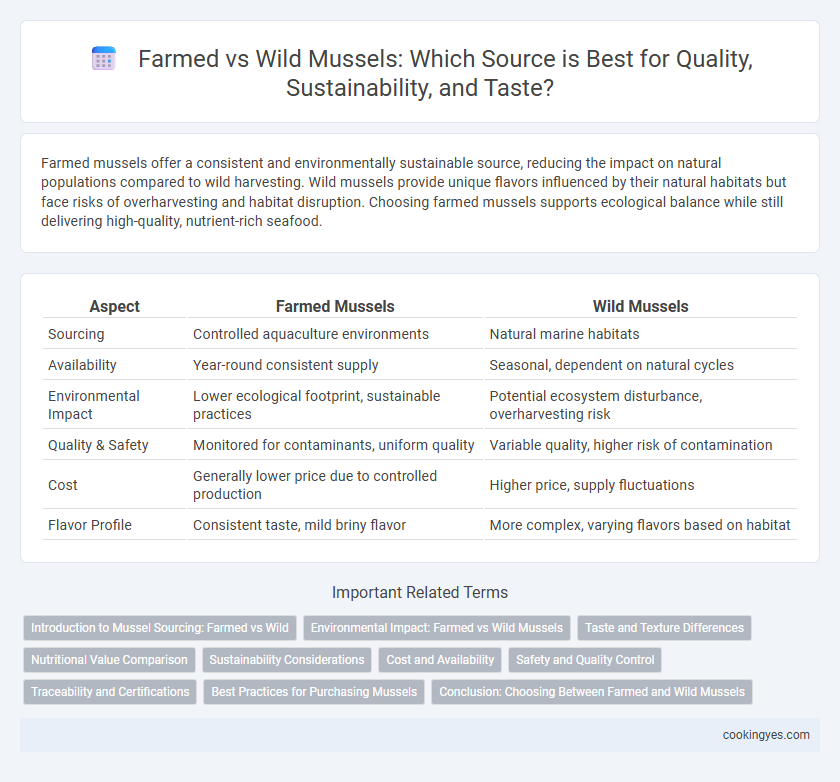Farmed mussels offer a consistent and environmentally sustainable source, reducing the impact on natural populations compared to wild harvesting. Wild mussels provide unique flavors influenced by their natural habitats but face risks of overharvesting and habitat disruption. Choosing farmed mussels supports ecological balance while still delivering high-quality, nutrient-rich seafood.
Table of Comparison
| Aspect | Farmed Mussels | Wild Mussels |
|---|---|---|
| Sourcing | Controlled aquaculture environments | Natural marine habitats |
| Availability | Year-round consistent supply | Seasonal, dependent on natural cycles |
| Environmental Impact | Lower ecological footprint, sustainable practices | Potential ecosystem disturbance, overharvesting risk |
| Quality & Safety | Monitored for contaminants, uniform quality | Variable quality, higher risk of contamination |
| Cost | Generally lower price due to controlled production | Higher price, supply fluctuations |
| Flavor Profile | Consistent taste, mild briny flavor | More complex, varying flavors based on habitat |
Introduction to Mussel Sourcing: Farmed vs Wild
Mussel sourcing involves selecting between farmed and wild varieties, with farmed mussels offering consistent quality and sustainability due to controlled aquaculture practices. Wild mussels are harvested from natural habitats, presenting variability in size and flavor influenced by environmental conditions. Choosing farmed mussels helps reduce overfishing and supports eco-friendly seafood production.
Environmental Impact: Farmed vs Wild Mussels
Farmed mussels have a significantly lower environmental impact compared to wild mussels, as aquaculture practices enhance water quality through natural filtration and reduce overharvesting pressure on wild populations. Wild mussel harvesting can lead to habitat disruption and decreased biodiversity due to dredging and collection methods. Sustainable mussel farming supports ecosystem balance while providing a renewable seafood source with minimal carbon footprint.
Taste and Texture Differences
Farmed mussels typically have a milder taste and a firmer, more consistent texture due to controlled growing conditions, while wild mussels often offer a stronger, brinier flavor with a slightly chewier texture influenced by natural environmental factors. Variations in water salinity and diet impact the flavor complexity, with wild mussels frequently exhibiting a more pronounced oceanic essence. Texture differences arise as farmed mussels benefit from stable nutrient availability, creating a tender bite compared to the variable firmness found in wild-caught counterparts.
Nutritional Value Comparison
Farmed mussels provide a consistent nutritional profile, rich in high-quality protein, omega-3 fatty acids, and essential minerals such as iron and zinc, comparable to their wild counterparts. Wild mussels often exhibit variability in nutrient content depending on environmental factors, but typically contain similar levels of vitamins B12 and selenium. Both sources supply significant antioxidants and low levels of contaminants, making them equally beneficial for a balanced diet.
Sustainability Considerations
Farmed mussels offer a more sustainable sourcing option compared to wild mussels, as aquaculture methods minimize ecosystem disruption and reduce overharvesting risks. Wild mussel populations face pressures from habitat degradation, pollution, and climate change, leading to declining stocks in some regions. Sustainable mussel farming practices, including site rotation and water quality monitoring, help maintain biodiversity and contribute to carbon sequestration in coastal environments.
Cost and Availability
Farmed mussels typically offer lower and more stable costs due to controlled cultivation environments, ensuring consistent supply throughout the year. Wild mussels often have higher prices influenced by seasonal availability and harvesting difficulties, leading to fluctuating market presence. The predictability of farmed mussel availability makes them a preferred choice for large-scale seafood suppliers seeking reliable inventory.
Safety and Quality Control
Farmed mussels undergo rigorous safety and quality control measures, including regular monitoring for contaminants such as heavy metals, pathogens, and biotoxins, ensuring a reliable and consistent product. Wild mussels may have higher variability in safety due to environmental factors and less controlled harvesting conditions, increasing the risk of contamination. Certification programs like Aquaculture Stewardship Council (ASC) for farmed mussels guarantee adherence to strict safety protocols, promoting consumer confidence in product quality.
Traceability and Certifications
Farmed mussels offer superior traceability due to controlled cultivation environments, enabling detailed tracking from hatchery to market. Certifications such as ASC (Aquaculture Stewardship Council) and MSC (Marine Stewardship Council) validate sustainable practices and ensure product authenticity in farmed mussel sourcing. Wild mussels often pose challenges in traceability and certification, increasing risks related to environmental impact and quality verification.
Best Practices for Purchasing Mussels
Farmed mussels offer consistent quality and traceability due to controlled aquaculture environments, minimizing environmental impact and ensuring sustainable sourcing. Wild mussels, while providing a unique flavor profile influenced by their natural habitat, require rigorous testing for contaminants and adherence to seasonal harvesting regulations to ensure safety and ecological balance. Prioritize suppliers with certifications such as ASC or MSC, transparent origin documentation, and compliance with local environmental standards to guarantee responsibly sourced, high-quality mussels.
Conclusion: Choosing Between Farmed and Wild Mussels
Farmed mussels offer a sustainable and consistent supply, with controlled environmental impact and lower contamination risks compared to wild mussels. Wild mussels often provide a richer, more diverse flavor due to their natural habitat but face population pressures and potential exposure to pollutants. Selecting between farmed and wild mussels depends on priorities such as sustainability, taste preferences, and availability.
Farmed vs wild for mussel sourcing Infographic

 cookingyes.com
cookingyes.com